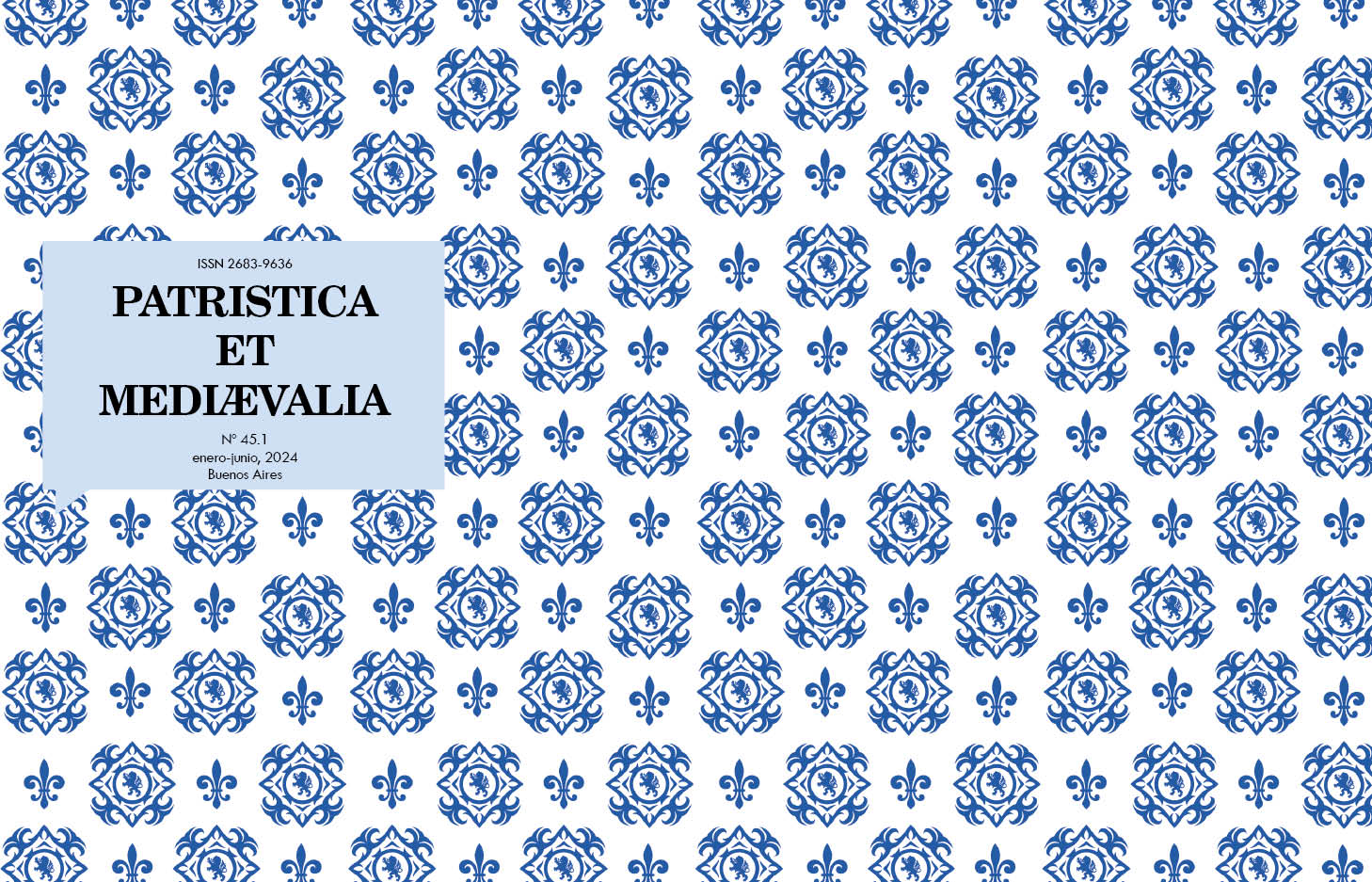El conflicto alejandrino del 38 d.C. como στάσις en Contra Flaco de Filón
Resumen
En Contra Flaco Filón define como στάσις el ataque antijudío del año 38 d.C. por el cual se vulneran los derechos de residencia y libre culto que los judíos afirmaban poseer desde la fundación de Alejandría. Uno de los principales argumentos esgrimidos por parte de griegos y egipcios es la ilegitimidad de la posesión de derechos por parte de los judíos a causa de su condición de extranjeros. Por consiguiente, los estudios historiográficos especializados han centrado su análisis en el debate sobre el estatus de ciudadanía de los judíos en la Alejandría del siglo I. El presente trabajo se correrá de esa perspectiva de estudio con el fin de hacer foco en la comprensión de las implicancias filosóficas e ideológicas de la interpretación de Filón a propósito de la ofensiva antijudía. Para ello, se analizará el concepto de στάσις que procede de la filosofía griega clásica. Dicho término expresa en Platón y Aristóteles la lucha facciosa entre conciudadanos por derechos y privilegios con una violencia semejante a la de una guerra contra los extranjeros. Así pues, se intentará demostrar que Filón utiliza el término στάσις en el sentido filosófico griego clásico para demostrar que la violencia antijudía es una guerra interna y, por tanto, un intento de subversión del orden legal romano.Descargas
Citas
Aristóteles (1968). Aristotelis Ἀθηναίων πολιτεία. Ed. Oppermann, H. Leipzig: Teubner.
Aristóteles (1984). Constitución de los Atenienses. Pseudo Aristóteles. Económicos. Trad. García Valdez, M. Madrid: Gredos.
Philo Alexandrinus (1906-1962). Philonis Alexandrini Opera quae supersunt. Vol. VI. Ed. Cohn, L. y Reiter, S. Berlín: De Gruyter.
Philo of Alexandria (2003). Philo’s Flaccus: the first pogrom: introduction, translation, and commentary. Trad. Van der Horst, P. W. Leiden - Boston: Brill.
Filón de Alejandría (2009). Contra Flaco. Embajada a Gayo. Trad. Torallas Tovar, S. En: Martín, J. P. (ed.). Filón de Alejandría. Obras Completas. Vol. V. Madrid: Editorial Trotta, 177-301.
Platón (1967-1968) Platonis Opera. Vol. I, III, IV y V. Ed. Burnet, J. Oxford: Clarendon Press.
Platón (2010 [1983]). Menéxeno. Trad. Acosta, E. En: Diálogos II:Gorgias. Menéxeno. Eutidemo. Menón. Crátilo. Madrid: Gredos.
Agamben, G. (2017). Stasis: la guerra civil como paradigma político. Ciudad Autónoma de Buenos Aires: Adriana Hidalgo.
Agamben, G. (2018). Homo sacer I. El poder soberano y la vida desnuda. Ciudad Autónoma de Buenos Aires: Adriana Hidalgo.
Arancibia Carrizo, J. P. (2020). “La ‘stásis’ y la tragedia de la democracia”, Hybris. Revista de Filosofía 11.1, 79-111. DOI: 10.5281/zenodo.3872132.
Chantraine, P. (1970). Dictionnaire étymologique de la langue grecque. Histoire des mots. Vol. II. París: Éditions Klincksieck.
Collins, J. J. (2005). “Anti-Semitism in Antiquity? The case of Alexandria”. En: Idem. Jewish cult and Hellenistic culture: essays on the Jewish encounter with Hellenism and Roman rule. Leiden - Boston: Brill, 181-201.
Druille, P. (2015). “La situación cívica de los judíos en los tratados de Filón”, Synthesis 22, 1-14.
Druille, P. (2017). “'El enemigo público’: causas y consecuencias del uso de la metáfora de la enemistad en los escritos de Demóstenes y de Filón de Alejandría”. En: Raquel Miranda (ed.). Metáfora y episteme: hacia una hermenéutica de las instituciones. Neuquén - Buenos Aires: Círculo Hermenéutico, 89-110.
Finley, M. I. (1962). “Athenian Demagogues”, Past & Present 21, 3-24.
Finley, M. I. (1984). La Grecia antigua: economía y sociedad. Barcelona: Crítica.
Gallego, J. (2014). “La crisis de la democracia ateniense a través del teatro trágico”, Argos 37, 62-90.
García Cataldo, H. E. (2009). “Historia y política en Aristóteles: Constitución de Atenas y Política”, Byzantion Nea Hellás 28, 13-29. DOI: 10.4067/S0718-84712009000100001.
Gambetti, S. (2009). The Alexandrian Riots of 38 C.E. and the Persecution of the Jews: A Historical Reconstruction. Leiden - Boston: Brill.
Gehrke, H.-J. (1985). Stasis: Untersuchungen zu den inneren Kriegen in den griechischen Staaten des 5. und 4. Jahrhunderts v. Chr. Munich: C.H. Beck.
Gruen, E. S. (2004). Diaspora: Jews amidst Greeks and Romans. Cambridge - Londres: Harvard University Press.
Liddell, H. G., Scott, R. y Jones, H. S. (1996). Greek-English Lexicon. Nueva York: Oxford University Press.
Martín, J. P. (2009). “Introducción General”. En: Idem. Filón de Alejandría. Obras Completas. Vol. I. Madrid: Trotta, 9-87.
Ritter, B. (2015). “The Stasis in Alexandria in 38 CE and Its Aftermath”. En: Wright, B. G. (ed.). Judeans in the Greek cities of the Roman Empire: rights, citizenship and civil discord. Leiden - Boston: Brill, 132-183.
Smallwood, M. (1976). The Jews Under Roman Rule. Leiden: Brill.
Van der Horst, P.W. (2003). Philo’s Flaccus: the First Pogrom. Leiden - Boston: Brill.
1. Los/as autores/as que publiquen en esta revista aceptan las siguientes condiciones:
-
Conservan los derechos de autor/a y ceden a la revista el derecho de la primera publicación, con el trabajo registrado con Licencia Atribución-CompartirIgual 4.0 Internacional, que permite a terceros utilizar lo publicado siempre que mencionen la autoría del trabajo y a la primera publicación en esta revista.
-
Pueden realizar otros acuerdos contractuales independientes y adicionales para la distribución no exclusiva de la versión del artículo publicado en esta revista (p. ej., incluirlo en un repositorio institucional o publicarlo en un libro) siempre que indiquen claramente que el trabajo se publicó por primera vez en esta revista.
-
Tienen permitido y se les recomienda publicar su trabajo en Internet (por ejemplo en páginas institucionales o personales).
2. Condiciones de auto-archivo. Se permite y se anima a los/as autores/as a difundir electrónicas la versión post-print de sus obras ya que favorece su circulación y difusión y con ello un posible aumento en su citación y alcance entre la comunidad académica. Color RoMEO: azul.













